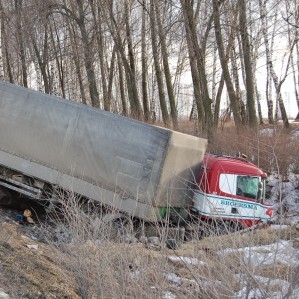Each year, approximately 4,000 Americans lose their lives in truck related accidents, and another 85,000 are injured. Alarmingly, the number of fatalities due to big rig accidents has been steadily rising since 2009. According to the Unites States Department of Transportation, speeding is the leading driver related factor in accidents involving large trucks.
What is even more disturbing is that the level of damage incurred in an accidentwith a big rig increases with each additional mile per hour. At just 65 mph., it can take a fully loaded large truck nearly the distance of two football fields to come to a complete stop. Some states have raised their highway speed limits to 70, 75, 80 and even 85 mph. For large trucks, these limits are reckless and needlessly endanger the lives of truckers and other motorists.
Increased speed raises the risk for the driver to lose control in the event of a tire blowout as well. Since most large truck tires are only rated for 75 mph., and big rigs frequently travel long distances at speeds equal to the maximum or greater, the chance of experiencing a tire blow out is increased. Between 2009 and 2013, approximately 223 fatalities were related to large truck tire blowouts.
The American Trucking Association says it has been warning trucking companies, drivers, and the federal government of the dangers of speeding trucks for years. In 2006, the “ATA petitioned the National Highway Traffic Safety Administration and the Federal Motor Carrier Safety Administration to require the speed limiter on all large trucks be set in order to electronically limit their top speed to no more than 65 mph,” according to the ATA President and CEO Bill Graves. According to the ATA, requiring speed limiters on large trucks will reduce injuries, fatalities, and property damage due to big rig accidents.
In January of 2011, the government decided to move ahead with the mandate, but more than four years later, the ATA is still waiting. While the Federal Motor Carrier Safety Administration (FMCSA) has not indicated the maximum speed at which these limiters can legally be set, the ATA recommends a maximum speed of 65 mph. for large trucks weighing over 26,000 lbs. and traveling on roads with speed limits of 55 mph. or greater.
The Canadian provinces of Ontario and Quebec mandated electronic speed limiters for large trucks all the way back in 2009. Advocates claim that the year the law took effect, fatalities related to big rigs in Ontario dropped by an impressive 24 percent from the year before, despite an increase of 59 percent in the number of big rigs registered. .Approximately 70 percent of trucking companies in the United States already limit the speed of their trucks with similar electronic speed governors. According to safety advocates, that is 30 percent too few.
Benefits of Electronic Speed Limiters on Big Rigs
Although many truckers are against requiring the placement of electronic speed limiters on large trucks, many experts claim that there are numerous benefits to mandating them.
- Safety: With speeding being a leading cause of trucking accidents, mandating speed limiters would likely reduce the number of accidents that result in injuries, property damage and fatalities. As a result, safety ratings would improve.
- Lower Insurance Premiums: Better safety ratings would likely mean lower insurance premiums for trucking companies.
- Better Fuel Mileage: Slower speeds result in large trucks getting better fuel mileage.
- Repairs and Maintenance: Faster speeds are harder on large trucks, requiring them to have maintenance and repairs done more frequently. Additionally, traveling at speeds faster than tires are rated for can cause heat to build up and the rubber to be damaged, raising the risk for blow outs that could result in an accident, and will definitely result in the need for new tires.
The National Highway Traffic Safety Administration reports that it is in the process of developing a new rule that will soon mandate electronic speed limiters on large trucks. Additionally, the NHTSA is working on changing tire labeling requirements to include the maximum speed for which big rig tires are rated.
Although the impact that electronic speed regulators will have on safety is clear, those who are opposed to the mandate claim that it will cause highways to become congested and create slower moving traffic when the big rigs attempt to pass each other. This, in turn, could cause hundreds of thousands of frustrated drivers which can lead to road rage accidents.
How A Speed Limiter Works
An electronic speed limiter, also often referred to as a “governor”, operates through electronic sensors which calibrate the truck’s speed and transmit that information to the engine’s computer. When the vehicle reaches a preset maximum speed, the computer restricts the flow of air and fuel to the engine.

